|
The wrinkles and creases on our faces are the registration of the great passions, vices, insights that called upon us... but we, the masters, were not home.
— Walter Benjamin

Walter Benjamin
July 15, 1892 – September 26, 1940
The street conducts the flâneur into a vansihed time. For him, every street is precipitous. It leads downward - if not to the mythical Mothers, then into a past that can be all the more spellbinding because it is not his own, not private. Nevertheless, it always remains the time of a childhood. But why that of the life he has lived? In the asphalt over which he passes, his steps awaken a surprising resonance. The gaslight that streams down on the paving stones throws an equivical light on this double ground.
— Walter Benjamin, The Arcades Project, translated by Howard Eiland and Kevin McLaughlin
_______________________
Trilobites
Elizabeth Hazen
threepenny review
Before you understood the risk of breaking
things apart, you sat beside your father
in the old stone quarry, mimicking the deft
slipping of his chisel between thin layers of shale;
before you had the threat of time holding
you, the arms of your child holding you, the voice
on the phone, Hold on—there was the quarry, the stones,
the heft of them in your cupped hands, the grace
of chisel, hammer, pick. You learned patience,
opening rock after rock, finding clusters
of brachiopods, fragments of thorax, or nothing
but smooth gray shale—and sometimes a trilobite
intact, spiny, armored, its halves fat
as big toes. ...(more)
_______________________
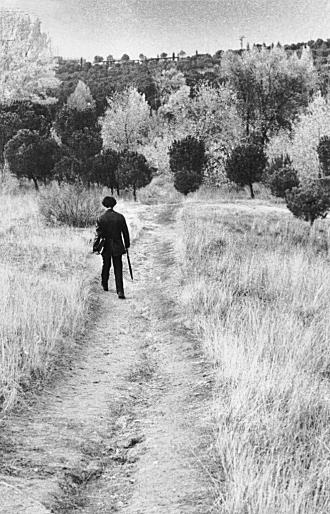
Charlie
Puerta de Hierro à Madrid
IN MEMORIAM
Frédéric Huijbregts:
Show must go on!
_______________________
Three Poems
John Johnson
conjunctions
Likely Story
These are the days everyone talks about: pixilated skies,
newness reinventing itself like an aura, each of us
driving away. In Coeur d’Alene (Heart of an Awl) you fall in love
with your eyes (which explains your boxer’s stance,
dust of A-bombs), enter the realm of the dead singing.
But out here, salmon and steelhead feint in heavy water.
Monkey flowers, bleeding heart flowers, moments that clutch.
Flies, too, attracted by rotting meat fragrance
certain flowers give off, saccades of day and night
riddled with speech or thoughts of speech.
Beyond the pleural trees, where the landscape breaks down,
tidewater goby’s drab little male makes a nursery of his mouth.
Contact calls the young. Daylight moon we can’t see either
sinks through salt brush, glasswort, with no idea.
Meanwhile we’re here, end of the loop, pausing by the gift shop
on our way out of the grove, into exploding sunlight,
relations who’ve never met. Equal and opposite, we seem
to hold one another without touching, beat the drumhead air,
try to get a word in. It was a pleasure. No, really.
We’ve got to come back again one day.
...(more)
John Johnson
_______________________
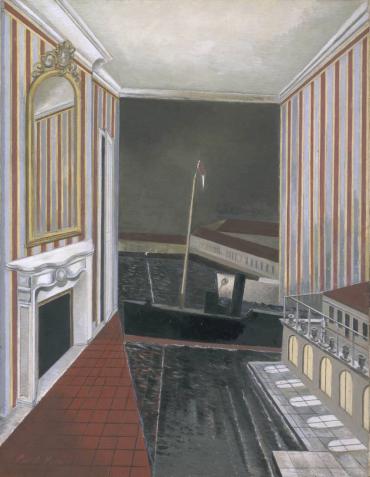
Harbour and Room
1932-6
Paul Nash
(11 May 1889 - 11 July 1946)
_______________________
Ned Ludd and Queen Mab:
Machine-Breaking, Romanticism, and the Several Commons Of 1811-12
Peter Linebaugh
google books
Monoskop
(....)
Had the sleeping sword awakened? Were the followers of Ned Ludd, like
the comet in the sky, wielding cosmic justice and do they still? If so, it was not
as Blake imagined because Jerusalem, a city of strife and division, is no longer
the egalitarian utopia of the Protestant millennium. An ecological rather than
the protestant nationalist note must now conclude this stirring and beautiful
hymn.
I will not Cease from mental Fight
Nor shall my Sword sleep in my hand
Till we occupy the Commons
To green and chill our baked Lands.
On the bicentennial of the Luddite direct actions on behalf of commonality, the chthonic powers beneath the earth and the cosmic spectacle above it accompanied the revolt against the machine. The Romantic poets responded to this relationship in two ways. First, they broadened our view from the local to the revolutionary macrocosm. Second, they helped make it possible to see machine-breaking as a means of defending the commons.
(....) _______________________

Promenade II
1920
Paul Nash
_______________________
An Evening with Tom Bradley
or The Japan of the Mind
Kane X. Faucher
exquisite corpse
The Berlitz phrase book meant to throw a linguistic bridge between two tongues is an otiose item in my hip pocket, and any attempts I make to crunch and grind the appropriate phrases in their English pronunciation are met with confusion, snickers, or derision.
I am en route to have an evening with Tom Bradley, author of Lemur, Even the Dog Won't Touch Me, Vital Fluid, and books like The Curved Jewels that scandalously have black-marked him for his brazen critique of a country he still resides in: Japan. I am ferried along by a perpetually smiling rent-a-driver as we swish through narrow winding roads rimmed on all sides by an austere dun landscape like one of those antique sepia photos of exaggeratedly stiff people sitting for the Sunday portrait. The mountain of Hijiyama is an etiolated backdrop, the windward western slope that took the cauterizing brunt of an atomic bomb, nature weakly creeping across its once vaporized face. I do not pay a visit to the atomic bomb museum. The entire region is now patched with American impedimenta and the ragged poultice of commercialism across its indelible scars. As we sluice toward the previously arranged meeting place, a chome virtually untouched since the era of the Shoguns, other details insinuate themselves within the paucity of features: miniature gardens, homunculus-sized houses topped by roofs with the trademark wisp on their edges. The angular mushroom caps of hokora Shinto shrines erupt every few blocks as a diminutive spirit-suburb grafted upon the village-scape. The meandering, anfractuous streets are filled with menacingly overwhelming choice of direction, an ancient labyrinth boiling up from the earth that takes the form of a feudalist version of a miniature golf course. I am let out by the driver who places his hands together with that same obsequious smile of servitude, apologizing in broken English that he cannot take me any further.
...(more)
_______________________
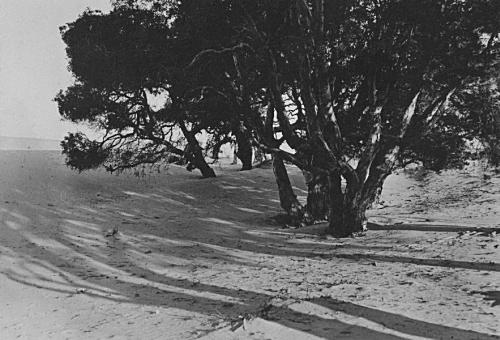
The ti-trees
Cecil Bostock
1917
_______________________
Keep It In Front Of You: D.W.Z.
(July 15, 1933-August 14, 2002)
Brad Zellar
Those days were an iron wagon loaded with rocks that we dragged through muddy fields with our teeth.
You were a magnificent burning boat that would not sink.
(....)
We knew when we once again retraced our steps that morning that this time we would not be coming back for you. We knew that you were ready –even if we were not—for a long journey, a journey for which you would require no shoes, no wallet or driver's license, no comb, razor, or shaving cream, none of the things, in fact, that we would carry away with us in plastic bags.
You and I had driven across the country together, east and west, and across Canada. We once drove a thousand miles with an eight-track of Lou Reed's The Blue Mask stuck in the deck and endlessly looping, and the entire time I waited for a protest from you that never came. We'd sat in the bleachers at spring training ballparks. You were always so happy, so eager, so utterly prepared to be amazed.
...(more)

La conquête de l'air
Roger De La Fresnaye
b. July 11, 1885
_______________________
Phenomenology of Giving: a Use Me Capitalism
Guest Edited by Arpine Konyalian Grenier
big bridge
when every leaf opens without any sound
and wishing is having and having is giving-
but keeping is doting and nothing and nonsense
... ... ... ... ... ... ... ... ... ... ... ... ... ... ...
when more than was lost has been found
and having is giving and giving is living-
but keeping is darkness and winter and cringing
E. E. Cummings
The nuances here do not originate from a give & take dynamic. We're talking a developing act that creates agency and beneficiaries on both sides of the equation. Talk about meaningful opportunities, hope resisting the skewered. Both source and filters are necessary as we explore the vagaries bypassing socio-political norms, as we implore thrills and chills that will land us at the shores of an aesthetic and narrative, historically, culturally and privately invaluable. A life lived as specimen looks at us teary eyed. When is giving in a giving? What did just happen? What was given? There is no product in giving but a fullness pushing forward, giving as part of or because or, does it matter?
Here are eleven contributors with talent and focus. I hope you find them inspiring. ...(more)
_______________________

Village at the Water's Edge
Roger De La Fresnaye
1910
_______________________
It may be the future depends on an orator,
Some pebble-chewer practiced in Tyrian speech,
An apparition, twanging instruments
Within us hitherto unknown, he that
Confounds all opposites and spins a sphere
Created, like a bubble, of bright sheens,
With a tendency to bulge as it floats away . . .
—Wallace Stevens, out of “Owl’s Clover” (1936)
.....................................................
I took a pebble from my pocket and sucked it. It was smooth, from having been sucked so long, by me, and beaten by the storm. A little pebble in your mouth, round and smooth, appeases, soothes, makes you forget your hunger, forget your thirst.
—Samuel Beckett, out of Molloy (1951)
Pebbles assembled by John Latta
1 2
_______________________
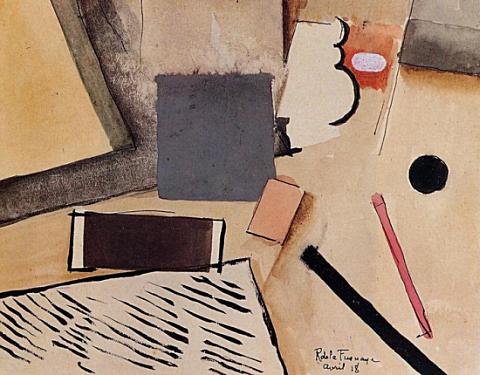
The Penholder
1918
Roger De La Fresnaye
_______________________
The Testament of a Stone
being
Notes on the Mechanics of the Poetic Image
Ivor Winters
(....)
Driven into a corner of which we are unaware, we pursue our ends . For in infinity, those who withdraw in terror are those who drive us off with bitterness, and at the same instant, in the same thought and gesture. Yet equanimity is all we seek.
(....)
Perhaps it is true that the poet, moving through his world, reaches, for chemical or other reasons, a point of spiritual intensity, and that those objects that fall under his eye or his mind's eye at this point are transformed into something simpler and greater than actuality, with or without his consciousness of any sequence save the actual sequence of their appearance; that the reproduction of this simplification in words will reproduce in the reader the original emotion or point of intensity. Perhaps it is true that the poet, moving throught his world, becomes aware of beautiful existences, and being moved by them to a sufficient point of intensity, is able to reproduce them in words with sufficient acuracy to create in his reader the emotion which they created in him. Or perhaps, and this is probably nearer to the truth, he is sufficiently moved by certain beautiful existences, to be able to create other beautiful existences; and this approaches T. S. Eliot's analogy of the catalyst, and his « significant emotion», which is probably the only sound statement of the creative process that we have. All functions of man save the creation of art and pure though tend to complicate his physical life without simplifying his life. The sciences, as abstractions, might have the same value as art. Indescriminately applied, they have wrecked the world.
(....)
Secession No. 8, 1924 [PDF]
Secession, 1922-24 (dir. Gorham B. Munson)
Jacket2 Reissues
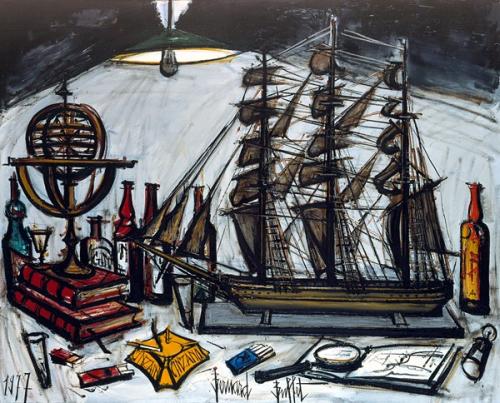
La caravelle
1977
Bernard Buffet
(10 July 1928 - 4 October 1999)
_______________________
Against Information: Reading (in) the Electronic Waste Land
Andrew Klobucar
... the iPad helps to re-form our relationship to electronic media, somewhat deceptively and regardless of its content, as a referential mode of representation. In other words, reading or viewing media using a touchscreen interface tends to re-situate such practices as physical activities first and cognitive ones second. One does not cognitively engage with media via these latest advances in screen-based interfaces so much as one physically interacts with it, while the screen itself, along with the media forms it suggests, function like any concrete entity or body to be handled and engaged accordingly. It functions as a musical instrument to be played as a keyboard, perhaps, or even a string instrument, if chosen and opened as such. In short, most users of a touchscreen device like the iPad will find themselves hard-pressed to discover they are in fact engaging with any kind of programming or language-based activity.
It is exactly this attribute of symbolic variability and plasticity, however, that throughout Modernist thought and writing has been habitually associated with attitudes of anxiety, if not terror. Rilke’s celebrated opening complaint in The Duino Elegies continues to haunt the annals of high modernism as an exemplary reflection on the sweeping cultural transformations associated with European civilization at the beginning of the twentieth century. In his first elegy, the poet offers only a plea for help concerning the post-Aristotelian uncertainties of aesthetic inspiration, presenting beauty itself as “nothing but the beginning of terror.” Rilke persists,
Each single angel is terrifying.
And so I force myself, swallow and hold back
the surging call of my dark sobbing.
Oh, to whom can we turn for help?
Thus we have one of the more formative images of western culture’s entanglement with the new political, economic, and intellectual realities of modernity. Proust, too, described the sensual appreciation of an artwork as nothing short of “traumatic,” likening a modern aesthetic experience to a kind of break or rupture in consciousness. The most exemplary literary works featuring this attitude of ideologico-historical crisis are likely T.S. Eliot’s contributions to the Modernist canon, as can be seen as early as in The Love Song of J. Alfred Prufrock (1917):
It is impossible to say just what I mean!
But as if a magic lantern threw the nerves in patterns on a screen:
Would it have been worthwhile
If one, settling a pillow or throwing off a shawl,
And turning toward the window, should say:
“That is not it at all, That is not what I meant, at all.”
...(more)
_______________________
Ancient Land Animal
Anselm Hollo
1
brain hovers above keyboard
cat slips in curls up
nothing comes to mind
then something comes too
they do a pas de deux
and that (if you ask me)
is la méthode
— so, no more epic awe code!
dig the streets!
come on up out of your whale!
wade ashore! hear gravel crunch!
use lots of exclamation points!
warble with ironic witch
’til dawn does closely fold you in
...(more)
_______________________
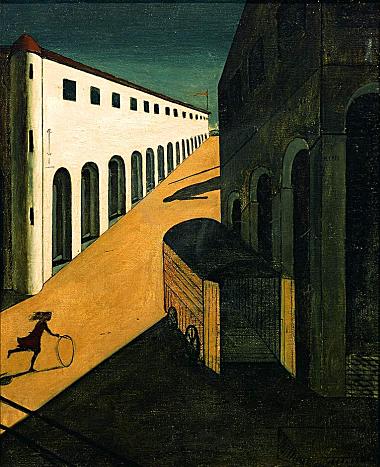
Mystery and Melancholy of a Street
1914
Giorgio de Chirico
(July 10, 1888 - November 20, 1978)
_______________________
25 Mexican poets 30 and under
Edited by
Pilar Rodríguez Aranda
big bridge
Poems
Raúl Aníbal Sánchez
On Silence
English version by the author,
revised by Pilar Rodríguez Aranda
Silence is the unbearable repartee
G.K. Chesterton
Silence and its play on words
sibilants whispers barely useful in this language
this bearded tongue
with his overcoat full of patches
Doctoral theses written on silence
weekly magazine essays
long troubled reflections
copies of old paintings
hermits with no lamp in the forest
Silence and his four hundred voices
his four hundred german mandarins
with untranslatable words explained in footnotes
What do they know about silence not even the chirp of the cricket
the siren in the night the high-pitched buzzing in the eardrum
that teenagers feel after swimming
the solitude where they think about that girl
who they can never ever talk to
Then the sea with his rock foam and mist
the yellow color the blue sky furrowed by seagulls
They argue in conference rooms
at the conferences of men of letters
cigarette smoke looking for perfect synesthesia
Meanwhile
outside
they leave life
the children
The clearings of ashes and grass parks and statues
mere blurry devices that leave us behind
before the miracle of rain we seek the puddle the wave
the part that from everything may offer us the answer ...(more)
_______________________
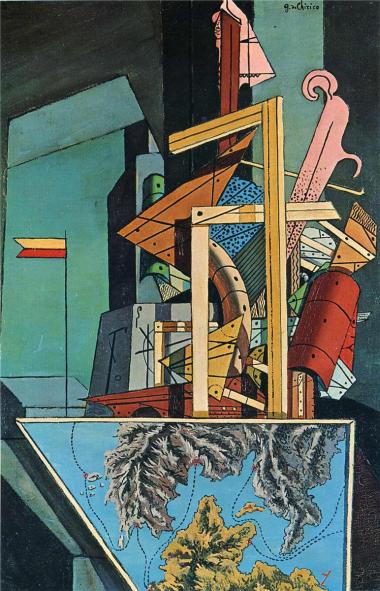
The Melancholy of Departure
Giorgio de Chirico
1916
_______________________
Trouble in Paradise
Slavoj Žižek on the global protest
(....)A political movement begins with an idea, something to strive for, but in time the idea undergoes a profound transformation - not just a tactical accommodation, but an essential redefinition - because the idea itself becomes part of the process: it becomes overdetermined.(....)
Today’s protests and revolts are sustained by the combination of overlapping demands, and this accounts for their strength: they fight for ‘normal’, parliamentary democracy against authoritarian regimes; against racism and sexism, especially when directed at immigrants and refugees; against corruption in politics and business (industrial pollution of the environment etc); for the welfare state against neoliberalism; and for new forms of democracy that reach beyond multi-party rituals. They also question the global capitalist system as such and try to keep alive the idea of a society beyond capitalism. Two traps are to be avoided here: false radicalism (‘what really matters is the abolition of liberal-parliamentary capitalism, all other fights are secondary’), but also false gradualism (‘right now we should fight against military dictatorship and for basic democracy, all dreams of socialism should be put aside for now’). Here there is no shame in recalling the Maoist distinction between principal and secondary antagonisms, between those that matter most in the end and those that dominate now. There are situations in which to insist on the principal antagonism means to miss the opportunity to strike a significant blow in the struggle.
...(more)
_______________________
How Copyright Makes Books and Music Disappear (and How Secondary Liability Rules Help Resurrect Old Songs)
Paul J. Heald
_______________________

Harmony in Blue and Silver: Trouville
1865
James McNeill Whistler
(July 10, 1834 – July 17, 1903)
_______________________
Sina Queyras: Short Take on I Don’t Feel So Good
And also of the energy between paragraphs. The energy of white space.
Here is Liz Bachinsky quoting Richard Ford on the torque that happens in a story when the author finds a way to make the implausible, plausible. I have been wondering about this torque. What makes a poem inhabitable? What makes the space plausible? What does this have to do with free verse, formal poetry, coiffed syllables, earnest content, the roll of the die? This is a serious question. So many contemporary poets are using fragment, for example, to try and achieve this torque. Fragment works when it comes out of something substantial and is arranged in such a way that the flames lick one fragment from another, hungry, the reader wants to slide her tongue into and down the poem. Fragment is not a way to make two disparate parts come together. You can’t place two of anything together and make it sing.
Unless you have something fabulous that you are cutting up. ...(more)
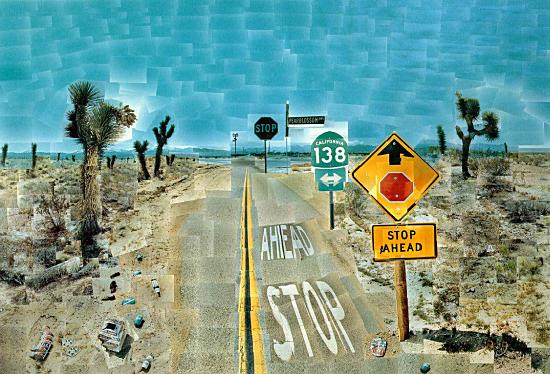
Pearblossom Highway
David Hockney
b. July 9, 1937
_______________________
How Rebecca Solnit Explains Things
San Francisco-based writer Rebecca Solnit's wide-lens perspective and undulating prose is not nearly as renowned as it should be.
Michelle Dean
Hazlitt
(....)
Let me explain why I’m such a partisan. A few years back, some forgotten someone sent me a link to Solnit’s essay on “Men Who Explain Things.” The experience of reading it was not unlike what I imagine the religious would say of the paths they found to God. Life divides into the time before, and the time after.
It starts with the story of how Solnit was once lectured by a man at a party about a subject she’d written a book on. He tried to insist that there was a book on the subject she’d missed, and as he talked further, she realized he was unknowingly talking about her own book. The man retreats, embarrassed, and Solnit writes, “Being women, we were politely out of earshot before we started laughing, and we’ve never really stopped.”
Sometimes I send men this essay. Often they get confused and ask things like, “But what if I really do need to explain something?” And, “Does this mean men can’t talk?” Getting her point appears to take an unusual amount of self-critical reflection. And the men who miss it tend to overlook that half of her argument is that women tend to be over-endowed with self-critical reflection.
One self-serving bit of evidence: It wasn’t so long after I read “Men Who Explain Things” that I began to write seriously, myself, after a lifetime of wanting it but not being sure I had “anything to say.” The essay showed me the fallacy of the premise, the idea that everyone who does write should have the assurance they do about what they say. Not only did she tell me not to listen to those men, she let me reflect, finally, on the wide world.
...(more)
_______________________
Iran's Postrevolution Generation
Words without Borders July 2013
The Poet, His Cut-Off Head in His Hand, Went Singing Songs and Ghazals: Literature in Iran
Shahriar Mandanipour
Translated from Persian by Sara Khalili Iran’s literature is wounded, but it still has blood, and in its blood lies a secret.
This literature has not borne the injuries of censorship only in the past thirty-odd years. In fact, it was censored during the reign of the two monarchs of the Pahlavi dynasty, during the rule of the Qajar dynasty when the country’s first newspapers were founded, and earlier, in the wake of every change in government or dynasty, every coup d’état, every collapse of state and ruler, and in the course of the numerous invasions by Turks and Moghuls and Arabs when thousands of its handwritten books were washed away or set on fire in its libraries.
Iran’s sky is filled with recollections of drifting paper ashes, and its rains bear ink in their memories. But during all these centuries, as some countries and governments and even languages around the world have vanished and entrusted their place to others, Iran’s literature has survived, and its survival has a secret.
The secret lies in the Persian language. ...(more)
_______________________

David Hockney painting
"The Road to Thwing, Late Spring", May 2006
Photograph: Jean-Pierre Gonçalves de Lima
David Hockney: modern master of colour
_______________________
Of Pilgrims and Anarchists
Ralph Clare
A review of Pynchon's Against the Day: A Corrupted Pilgrim's Guide edited by Jeffrey Severs and Christopher Leise
While each of the essays holds merit in thinking about Against the Day and Pynchon’s work as a whole, the essays on anarchism—focusing on both anarchic aesthetics and ethics—are perhaps the most intriguing in the collection. There has always been an anarchic feel to Pynchon’s work—in both its form and content—and Against the Day, as this collection proves, has simply brought it to the fore. In addition, the ever-pressing question of “What is a poor preterite to do?” is given a new set of possible answers within such an anarchist “framework,” which is flexible enough to respect individual and collective freedoms. That said, A Corrupted Pilgrim’s Guide is strong from start to finish, a valuable edition to the overflowing stacks of Pynchon criticism and, we might say in sympathy with the novel’s anarchists, dyn-o-mite! _______________________
And the Last Shall Be the First
Ralph Clare
A review of William Gaddis, 'The Last of Something': Critical Essays.
(....)
‘The Last of Something’ also hosts a wonderful entry by William H. Gass, Gaddis’ long time friend. In “The Kvetch, the Bitch, and the Rant,” Gass, in his typically supple prose, offers an amusing generic typology of one of Gaddis’ favorite formal devices (the rant), especially as displayed in Carpenter’s Gothic. Gass describes the rant as “angry in tone, blasphemous in expression, pell-mell in delivery, built of associations rather than logical connections” and ultimately “driven by despair”. The rant, it seems, fits well with Sacvan Berkovitch’s definition of the American Jeremiad. The kvetch and bitch each have their own provenance too. “The kvetch,” Gass writes, “is hinged to the rant like a door to a frame: the kvetch is particular, the rant general; the kvetch intimate, the rant impersonal”. Opposed to this is the bitch, which is “low toned,” common, and not as personal or “purely egocentric” as the kvetch. By this definition, Job is the kvetcher par excellence. And if I were allowed my own Bercobitch here it would be to ask for more regarding the relationship between the rant and the Jeremiad. However, Gass’ new rhetorical genres, or sub-genres, offer a different and humorous way of conceiving of the secularized version of the Jeremiad, and not by merely calling it an anti-Jeremiad.
...(more)
electronic book review
_______________________
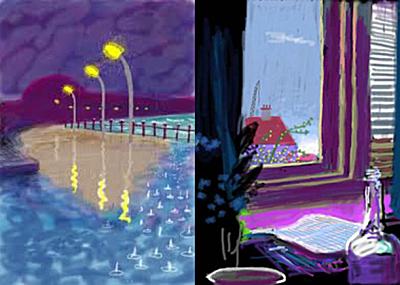 ipad painting
David Hockney
_______________________
e-flux #46 June 2013
Editorial—“Accelerationist Aesthetics”
Gean Moreno
Where did the critical tradition of art go? Maybe that’s the wrong question. Because we know the answer. It went into spectacle. It went into finance. It got privatized, democratized, scrutinized, defunded, bureaucratized, then professionalized. The critical stick became a seductive carrot. But maybe we don’t have to see this only in terms of a fall from grace. Maybe this is the time for a long-overdue realism that an art field still in the thrall of modernist humanism struggles to avoid recognizing. Isn’t it strange how we are subjected to the most extreme aspects of this new order and yet still suppress its most emergent qualities? What if we suspend the guilt of lapsed certainties and good-person compulsions for just a moment and take a look in the mirror? What would we see? We might see velocity-driven psychotics ravaged and dragged through sky and sludge, crying from revolution teargas and boring discussions at the same time. We might see uneducated beasts using their own bodies to mash culture with physics with economics with mysticism. We might see a strange new form of human tumble out. For the Summer 2013 issue of e-flux journal, we are very pleased to present Gean Moreno’s guest-edited issue on accelerationist aesthetics. Read it at the beach!
— Julieta Aranda, Brian Kuan Wood, Anton Vidokle
The entrenchment of neoliberal fundamentalism has been accompanied by a desire to save whatever critical edge art production can still muster. This has become increasingly pressing as art becomes decor for the offices of hedge fund managers, and as the art world—as David Graeber put it somewhere—mutates into “an appendage to finance capitalism.” The urgency to maintain a critical edge has manifested itself variously: in a turn toward post-autonomia theories that shed light on the position of the cultural producer within a post-Fordist regime of labor; in the production of artifacts that engage reflexively with the conditions of production, display, and circulation in the art world; in recovery operations that target particular legacies, such as those of politicized Conceptual art and structuralist or essayistic filmmaking; in interventionist efforts that leave behind the commercial circuits of art presentation altogether and attempt to work in the social field itself. The common aim of all these efforts amounts to approaching concrete conditions soberly, to being analytical and measured. A subtractive logic is the general animating force: take away—subjective imprint, gratuitous ornament, traces of skill, commercial viability, ambivalent postures, ideological residue, and so forth—until a potent and probing, if often flat-footed, proposal crystallizes.
Past the edges of the art world, however, where the condition of privilege doesn’t haunt every gesture with the possibility of contradiction, less “sober” engagements with the social are awake and on the prowl. ...(more)
_______________________

Consumer's Rest Chair
Frank Schreiner
The Gallery of Object-Lessons Past
_______________________
Horrors Of The Avantgarde: Twenty Years Ago In The Corpse
Andy Robbins
In Stove Polish, On Paper Grabbed From a Burning Mansion
My flung careful few, steady bells at the pleat ends of the operating skirt our carburettori have draped over the planet, napkin framed around the unformed fontanelle of now, the soon-to-be-cicatricose present, for which, as the price goes up, many will be sacrificed: now, as the willow is in first bud like a giant whip of green pearls in a chthonic fist, and in the wind the metasequoia roars as if on fire, now they approach with scalpel and spoon, our polity lies on the metal tray in a pool of noxious black liquor, the semen of men fed on anthracite.
2
If crude inhabits the eye, surely sickness will follow the gaze that looking can transport to August even the vast meatlocker of the upper Midwest, fard up the superface, cry on the table at which our daughters sit in bright, hungry dresses, the look that is hitched as always to the insane proposal that the taste will always emerge which confirms any course.
3
Our carburettori promulgate measures that seem natural because we suffer them as inexorabilities and Harmony is wreck’t. Horror is married to our Grief, deformity added to Pleasure. And we seem to have a touch for nothing but ourselves, uncommon, who have begun to speak for the ludicrous spectacle of trying to speak in a way that will make all other speech gloss, while, post-compression, in acceleration, allusion to community is lost, while by tongue we continue to disintegrate, giving off an attractive local heat, a faint blue flickering light. It pulses in a morose code: WHO ARE WE?
...(more)
_______________________

landscape-tunnel
David Hockney
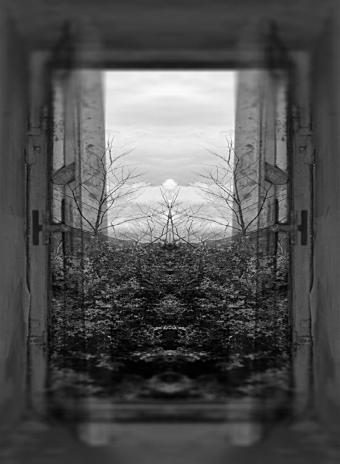
Flowers From Exile
Azenoire
via
_______________________
Poems
Tatiana Shcherbina
Translated by J. Kates
An Offshoot of Sense
I used to believe - suddenly, I don't,
My trivial faith in life has fled
like a puppy banging through a door
or this wind with its tail between its legs
and the door itself kicked off its hinges
from the reign of on to the black-out off.
Lightbulbs flickered, something sparked
in the wiring in my muscles - blood.
Maybe as icy cold as Venus
Or maybe as scorching hot as Mars,
it's not the temperature shining - belief
but bright-black, to tear out your eyes,
the entire cosmic fabric trembles
on a simple breeze, an anticyclone
of earth continually brings forth things,
a new edition, upgrade, a clone.
The cyclone blows without a hitch
through treetops, over roofs and wires,
and the world, dependent on it, strong,
mindless, and empty as a desert.
My understanding, my creative act,
is taken not as the crown of science -
as history. I give out my poetry
like sound, a negation of the silence,
a token of solidarity with those
who repeat from age to age
after the schoolteacher in class.
A clinging little singing firefly
climbs high up into a tree,
an offshoot sprouting on the naked twig.
See how it scratches at my ear,
a little leaf, a little ray of sun.
...(more)
Twenty-first Century Russian Poetry
Edited by Larissa Shmailo big bridge
_______________________
We all need shelter
Murdo Macdonald
presented by Alec Finlay
Shelters are changing. A self-defeating global economy threatens physical shelter by shifting the weather into more extreme cycles of flood, drought and storm. At the same time the emotional and intellectual shelter of personal privacy crumbles under the weight of surveillance technology. Thus global warming and state oppression give an edge to any thought of shelter. But our needs are still the same. We all need shelter.
A physical shelter shields us from the weather and creates a tolerable, often wonderful, microclimate. But the necessity for all of us is that such a microclimate must be as much a microclimate of the mind as it is of the body. A real shelter addresses both these aspects.
When Joseph Beuys said that ‘everyone is an artist’ he meant that the impulse to make and understand art is inherent to every one of us. To make art is to be human. Art thrives when we are properly sheltered both emotionally and physically.
A shelter is thus not first and foremost a structure of roof and walls and floor and windows and doors, it is a place that makes possible a free state of mind. A shelter is not just a space. It is a place that exists within a landscape – urban or rural, flat or mountainous, maritime or inland. It addresses that geography and when that geography is appropriately addressed, we who inhabit those shelters are able to function properly as human beings.
For Gautama, such a place of emotional security had no walls and the shelter was the enclosing canopy of a tree. Sheltered by his locality he experienced enlightenment and became Buddha.
...(more)
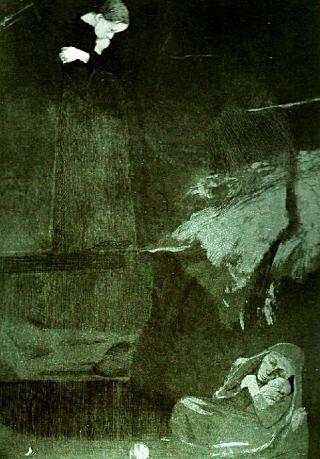
Gretchen
Käthe Kollwitz
July 8, 1867 – April 22, 1945
_______________________
... history suggests that we should worry less about the surveillance itself and more about when the war in whose name the surveillance is being conducted will end.
Lincoln’s Surveillance State
David T. Z. Mindich
(....)
When I first read Stanton’s requests to Lincoln asking for broad powers, I accepted his information control as a necessary evil. Lincoln was fighting for a cause of the utmost importance in the face of enormous challenges. The benefits of information monitoring, censorship and extrajudicial tactics, though disturbing, were arguably worth their price.
But part of the reason this calculus was acceptable to me was that the trade-offs were not permanent. As the war ended, the emergency measures were rolled back. Information — telegraph and otherwise — began to flow freely again.
So it has been with many wars: a cycle of draconian measures followed by contraction. During the First World War, the Supreme Court found that Charles T. Schenck posed a “clear and present danger” for advocating opposition to the draft; later such speech became more permissible. During the Second World War, habeas corpus was suspended several times — most notably in Hawaii after the Pearl Harbor attack — but afterward such suspensions became rare.
This is why, if you are a critic of the N.S.A.’s surveillance program, it is imperative that the war on terror reach its culmination. In May, President Obama declared that “this war, like all wars, must end.” If history is any guide, ending the seemingly endless state of war is the first step in returning our civil liberties.
...(more)
_______________________
Snowden, Surveillance And The Secret State
David Cromwell and David Edwards
media lens
'Remember, any state, any state, has a primary enemy: its own population.' (Noam Chomsky, Understanding Power,
(....)
... As Norman Solomon correctly points out:
'The state of surveillance and perpetual war are one and the same. The U.S. government's rationale for pervasive snooping is the "war on terror," the warfare state under whatever name.'
Solomon issues a warning:
'The central issue is our dire shortage of democracy. How can we have real consent of the governed when the government is entrenched with extreme secrecy, surveillance and contempt for privacy?'
Washington and its allies, sold to the public by the media as 'the international community', are well aware of the stakes. The general population must be subdued and kept in its place. Obama and his officials in the government, and the US intelligence community, need to assert strenuously that Snowden's exposure of the massive US secret surveillance programme aids and abets 'the enemy', and damages international relations. (....)
Fortunately, there is an inherent weakness here, because the system is maintained only so long as there is large-scale public acceptance of the status quo. Noam Chomsky puts it well when he says that:
'even the most efficient propaganda system is unable to maintain the proper attitudes among the population for long. [...] fundamental social and economic problems cannot be swept under the rug for ever.' (Noam Chomsky, Deterring Democracy)
There is thus plenty to be said about living under a giant system of government surveillance. Just don't expect the corporate media to explore the full extent of what it really all means. ...(more)
_______________________
 Cordes
1912
André Lhote
(5 July 1885 – 24 January 1962)
_______________________
Jacobin Book Club: The Making of Global Capitalism
Mike Beggs
Hardt and Negri’s Empire. Meiksins Wood’s Empire of Capital. Harvey’s New Imperialism. Already this young century has seen a number of Marxist luminaries reinvent the concept of imperialism to understand the last few decades, in which capitalism has entrenched itself truly as a world system, and in which the American state has set itself so far above any rival. Once imperialism meant national capitalisms clashing through the military power of their national states; now we have a system of national states, under the clear leadership of the United States, superintending and troubleshooting an international economy.
Into this field comes Leo Panitch and Sam Gindin’s magnum opus, The Making of Global Capitalism: The Political Economy of American Empire. It is at once recognizable as part of this new breed of thinking on empire, and a book that brings it to new levels of detail and depth. It is a history rather than a work of abstract theory, but readers familiar with the debates of recent years will spot a tightly argued position, elaborating work developed in the Socialist Register‘s last decade.
Over the next couple of weeks we will run the inaugural Jacobin Book Club seminar on this book, which deserves to be widely read on the Left. Every couple of days we will post a contribution on an aspect of the work. Then Panitch and Gindin themselves will respond.
...(more)
The Luchadores of Global Political Economy
Nicole Aschoff
In the world of lucha libre a class war rages. Técnicos battle rudos, head-butting and scissor-kicking for the common man against capital and the state. In the battles of global political economy Leo Panitch and Sam Gindin are master técnicos. Their new book, The Making of Global Capitalism: the Political Economy of American Empire, examines how “the American state developed the interest and capacity to superintend the making of global capitalism.” Global Capitalism is burly and, like the great El Santo, difficult to pin down, so in what follows I will focus on only one aspect of the book: Panitch and Gindin’s analysis of financialization.
...(more)
.....................................................
Half Poulantzas, Half Kindleberger
Henry Farrell
(....)
The mainstream of American international political economy has cast off both its more radical connections and its ambitions to speak to larger debates. Marxists and radicals continue to work on international political economy, but they are largely ignored by the dominant figures in the field.
This is a pity — as Panitch and Gindin’s book shows, there’s a lot that they could learn. And if most standard issue international political economy scholars don’t know much about Marxists, the opposite is not necessarily true. Panitch and Gindin not only know the debates among radicals, but have read very widely across the field of IPE, engaging with (and often usefully repurposing) the ideas and empirical material that they find useful.
I learned a lot from their book, and will be assigning it to my students. Still, I think there’s room for useful argument. To be clear, Panitch and Gindin are clearly far better read in the debates that I follow than I am in the debates that they follow. This means that some (and perhaps most) of the disagreement below is of the ‘why didn’t you write the book that I would have written if I were you’ variety, so discount it as you think appropriate. I’m almost certainly not the audience they imagined that they were writing the book for. Yet their account of the entanglement between American imperium and neo-liberalism conceals as well as reveals. There are some causal relations — arguably quite important ones — that are invisible to it.
...(more)
_______________________
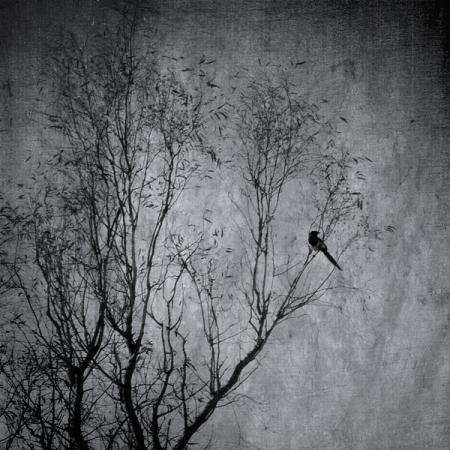
I call on the bird :I:
Azenoire
_______________________
On A Scale Of 1 To 10
for Betty
On a scale of 1 to 10
the rain falls wet
Lenin's mummy outlasts glasnost.
The kingdom of cicadas rises and falls,
on a scale of 1 to 10
our caves are brighter now and less dank
diner coffee keeps getting better
waitresses get older and blonder
and I don't know for sure where all this goes
Nero Wolfe would call it amphigory,
nonsense verse, nonsense with numbers,
(....)
on a scale of 1 to 10 am I here yet,
is there anyone behind this noise you hear,
people buzzing about the cicadas, poor things,
they don't even exist on a scale of 1 to 10,
only André Breton has got their number,
Arcane 17 from long ago Gaspé, and Canada,
what is Canada on a scale of 1 to 10,
and shall I count the ways,
let alone Massachusetts?
...(more)
Mill Of Particulars: The bLog of Robert Kelly
_______________________
Tao Lin: the Old Master
a guest post by Thomas Bernhard, reviewing Tao Lin's Taipei.
waggish
When, about a year ago, I did concern myself accurately and radically with Tao Lin, I could not believe my eyes and ears. Such faulty and bungled English or American, whichever you prefer, I had never before read in my whole intellectual life in an author who is, of all things, famous today for his precise and clear prose. Tao Lin’s prose is anything but precise and it is the least clear I have come across, it is packed with distorted metaphors and faulty and confused ideas, and I really wonder why this provincial dilettante is today revered to such an extent by writers, and above all by the younger writers, and not by any means by the least known or least noticed ones.
...(more)

a young seated boy with a book
circa mid 1840's
Once Removed:
The persistence of invented memory
Being a study of daguerreotypes, time, oblivion, and the poetics of beauty in the annihilated image
Shaun Caton
(....)
Without the pecuniary framework or cultural incentive to collect irretrievably scratched daguerreotypes the reader may find cause for considerable consternation at this seemingly bizarre enterprise. From infancy we are brainwashed to appraise an occidental notion of art and pictorial representation as either, beautiful or ugly - or more fundamentally, good and bad. In applying this banal and limiting process of appraisal to daguerreotypes we are able to make ' selective ' choices based upon an enforced and blinkered education on the condition of things. Thus, imperfection is generally regarded as unrewarding and is not acknowledged as worthy of investment unless the item in question happens to be something very ' exceptional ' such as a whole plate outdoor scene. Then, it would seem, that despite thumbprints (operator's signatures?), wipes, and scattered tarnish the image is still desirable, simply because it is big and shows an exterior landscape. Enter here the concept of rarity to embolden and ballast this hypothesis and we have what is proverbially called in the trade as a ' winner '. There is surely some irony here?
(....)
So, how can one entice interest in an image that has literally given up the ghost? Can such a possibility for relating to these impaired pictures be offered as an alternative visual aesthetic to that which was originally sublime? In an abstract sense can the beholder of the ancient mirror photograph inhabit its blackened and pock marked surface with any nostalgic sense of symbiosis or synasthesia? Such a premise may appear monstrously fantastic to a body conscious society which is principally obsessed with improving outward appearance through the employment of cosmetic surgery, radical dieting programmes and a spurious addiction to the booming therapy industry. Can we attribute such obtuse and superficial value systems to inanimate objects that completely exist as mementoes outside of our own somewhat fractured time frame?
...(more)
Secrets of the Dark Chamber
The Art Of The American Daguerreotype
Best in Show
American daguerreotypes at the Great Exhibition
Marcy J. Dinius common-place
The Social Construction of the American Daguerreotype Portrait
Ben Mattison
The Daguerreotype In America
Beaumont Newhall google books
The Daguerreotype: nineteenth-century technology and modern science
M. Susan Barger, William Blaine White google books_______________________
Hemingway and Salinger Died For Your Sins: An Independence Day Exchange
Gary Corseri and Adam Engel
(....)
E: Well, J.D. Salinger: a Life, is an excellent and timely combination of biography and close literary criticism.
C: Pretty timely review for all the 4th of July hoopla, ey? Nice antidote to all that flag-waving, cockadoodling-do! In this Internet Age, I’d like to see more reviews written this way! Writers can bounce off each other’s ideas; it broadens the conversation!
...(more)
_______________________

Portrait of a Chartmaker
Pietro Vesconte
dated 1318
The History of Cartography
Edited by J. B. Harley, David Woodward and G. Malcolm Lewis
free pdf from University of Chicago Press
_______________________
'cookbook'
M/C Journal Vol. 16, No. 3 (2013)
Cookbook: A New Scholarly View
Donna Lee Brien, Adele Wessell
Our interest in this subject reflects the popular interest in all food-related media, which appears higher than ever. In terms of our own special interest in relation to this issue of MC Journal—cookbooks—they continue to be produced and purchased at an unprecedented rate. Cookbooks have also recently attracted considerable scholarly attention. Their significance has been assessed in literary terms, as well as for what they say about women’s lives, the self, society, a particular historic period, national culture, and food making knowledge. The study of cookbooks has illuminated broad societal processes as well as intimate family memories. Equally, cookbooks are a wonderful example of material culture; they have historic and social value that make them important components of both institutional and personal collections. The cookbook itself, as an object, is also under transformation as the opportunities offered by new media and such changes in the publishing landscape as quality self-publication have expanded the possibilities of their use and value. This has, both been caused by, and prompted, a rethinking of traditional models.
In proposing this topic we, therefore, set out to explore the multifarious meanings of cooking literature in contemporary society. Areas of investigation include: writing, editing, and publishing cookbooks; celebrity chefs and their cookbooks; and, cookbooks and the media more generally whether this be in relation to print, or television, blogs, and new, and social media. This brings up issues of the process of production—what we could call “the art” of cookbook making—how they are written, illustrated, and designed—and the creative careers of these makers.
...(more)
_______________________
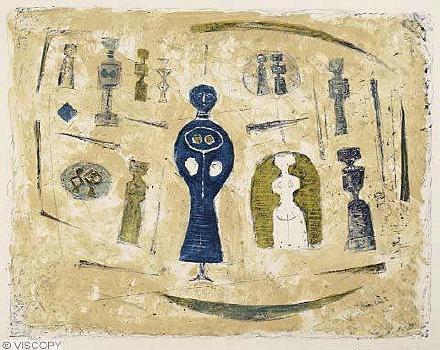
La dame Bleue
Massimo Campigli
July 4, 1895 - May 31, 1971
_______________________
With My Dog-Eyes
Hilda Hilst
Translated from the Portuguese by Adam Morris
bomb
A cross on the brow
The facts of what I was
Of what I will be:
I was born a mathematician,
a magician
I was born a poet.
A cross on the brow
The dry laughter
The scream
I discover myself a king
Sequined in darkness
Knives striking
Time and wisdom.
God? A surface of ice anchored to laughter. That was God. Even so he tried to cling to that nothing, sliding frozen somersaults until finding the anchor’s thick rope and descending descending in the direction of that laughter. He touched himself. He was alive, yes. When the child asked his mother: and the dog? The mother: the dog died. And so he threw himself on a patch of earth curdled with squash, hugged himself against one, a twisted cylinder with an ochre head, and choked out: died how? died how? ...(more)
_______________________

Ralph Eugene Meatyard
_______________________
Fear of an Empty Life
Jennifer Moxley
jacket 6
All the long imprint of a smooth utterance - a single adhesive
word slips away, snuggles beside the accusatory newborn
thought which, barking from lack of care, might trap in a moment
of serious sorrow me and my dirty heart, we twist the arm
of friendship 'til the ancient swing by the nonchalant body
is rewritten as a trembling, angry, grudge. Split along
the physique axis of wrested love and that human pulp
the wealthy mock, old need, a shuffle from the coffin lip
silences mind into fiddlehead body, bobbing in the fifty-fifty
sheets, weighty yet so pitiful it cannot coax solution - Darwin
was a fool, conductor of teeming masses, I see them now
in sedimentary patterns, crushed umber colors and a hint of green.
...(more)
Jennifer Moxley at EPC and PennSound

photo - mw
_______________________
Extratemporal meditations:
Proust as Philosopher: the art of metaphor by Miguel de Beistegui
Stephen Mitchelmore
(....)
It has to be said my efforts to resist outweigh anything a refutation might bring forth, no matter how fine the examples. They are untimely. Despite Reality Hunger comprising quotations and brief reflections that might have easily fallen into a Tumblr void, it commands influence precisely because it is a book. The form of a book, any book, transcends the sum of its contents by appealing to a coherent unity and the promised land of truth. The title is that unity. Corporate journalists found the premise congenial of course and the common reader was thereby tuned in to the buzz. A student correspondent of mine reported "energised" discussions on the library steps as his fellows passed the book around; after all, the food metaphor of writing's relation to the world is a tasty, bite-sized morsel.
(....)
I know my shudder over for the first line of Reality Hunger quoted above is more than a connoisseur's disdain for commonplace phrases and metaphors; sentences affect my experience of the world. Beginning of time, figure out, what the artist thinks – these are cold, shallow words evoking a cold, shallow world. And while this may seem unduly subjective and impressionistic, Socrates' objection to writing suggests a deeper reason, something fundamental to the impulse to read and write and the paradoxical gifts of the novel. What recommends itself then is an alternative model for the relation of writing to the world.
Miguel de Beistegui's book Proust as Philosopher offers just that. Set aside the dry title for now. It is an unfortunate consequence of the title of the French original, Jouissance de Proust. A literal translation – The Joy of Proust – conjures an image of a bearded man grappling sweatily with a curvaceous fountain pen, and those involved were right to reconsider the title. However, jouissance is key because for Proust's narrator the proper search is for a relation to reality that might enable essential knowledge and genuine happiness, even.
...(more)
_______________________

Fortune Teller
c. 1930
André Kertész
1894–1985
1 2 3
_______________________
Rochelle Owens: Hermaphropoetics / Blood
presented by Jerome Rothenberg
In an early version
a deaf mute
a hermaphrodite
captured after the siege
a hermaphrodite
emptied of allegory
seated on the stump of a tree
wearing body paint
his soaring paper thin
shoulderblades
the dome of her skull
his earlobes
the angle of her nose
his fat ankles
her perfect toes
his legs collapsing under her
multiple hues of flat color
triangles of purple
circles squares stripes
Teasing femme/homme
hypermasculine hyperfeminine
murderous sex cells
...(more)
Rochelle Owens at PennSound
Rochelle Owens: Out of Ur — New & Selected Poems 1961-2012shearsman
Triptych Rochelle Owens scribd
an excerpt of "Chomsky Grilling Linguica" by Rochelle Owens_______________________
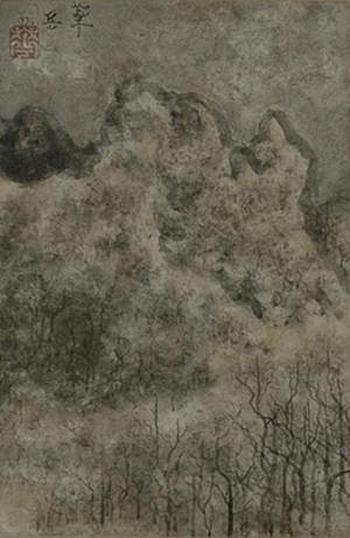
Cold Mountains and Withered Trees
1938
Kagaku Murakami
b. July 3, 1888
_______________________
On Foucault’s Review of Cassirer’s Philosophy of the Enlightenment
James Schmidt
Persistent Enlightenment
(....)
Foucault’s discussion begins by noting that, though Cassirer’s study of the Enlightenment dates from the 1930s, it is very much a work of our own time, provided we learn how to hear its message through the “background noise” that it sought to oppose, but which quickly engulfed it.
(....)
... the review shifts its focus in a way that makes the relevance of Cassirer’s study for Foucault’s own work abundantly clear. What is at stake is the implication of the almost hackneyed characterization of Cassirer as a “neo-Kantian.” For Foucault, this familiar term amounts to something more than the name of a school of thought. Instead it signifies
the inability of Western thought to overcome the break (coupure) effected by Kant; neo-Kantianism (in this sense, we are all neo-Kantians) is the ever-repeated injunction to reiterate this break – both to recover its necessity and to take its measure.
Cassirer’s study of the Enlightenment matters for Foucault, then, because in contrast to his other works it grapples with historical, rather than epistemological, questions, with those “fatalities of reflection and of knowledge” that Kant made possible and which have gone on to become fundamental for the constitution of modern thought.
Interrogation doubles back on itself: Kant asked how science could be possible, Cassirer asked how this Kantianism to which we appear to belong was possible. ...(more)
Persistent Enlightenment
via New APPS: Art, Politics, Philosophy, Science
_______________________

photo - mw
_______________________
King Gubu
King Of The Gobshites
transposition of Jarry's Ubu to Ireland
Tom Quinn
Act One
Scene One:
(Music loud Père Ubu - the stage is surrounded with garish flesh and blood coloured images of torture and debraining). Mister Gubu dressed in a bulbous green leprechaun outfit with hat and silver buckle. On his belly an inward curving gold spiral like a living Newgrange. Missus Gubu dressed as half-Irish Colleen, half-crone. Mister Gubu is enormous and carries a shillelagh. Mister Gubu advances to the front of the stage and stares menacingly into the auditorium. Mister Gubu - Gobshites!
Missus Gubu - Oh, would you ever whist with yur Gubu-ulations, Mister Gubu, ya big eejit ya!
Mister Gubu - Ooh! Ooh! Careful now! Don't have me to do ya in now, Missus Gubu!
Missus Gubu - It isn't me ya should be doin' in, Mister Gubu, it's another fellow altogether.
Mister Gubu - Green shite, m'dam, I don't understand a word yur saying.
Missus Gubu - Wha' then, Mister Gubu, is it contented with yurself y'are?
Mister Gubu - Shite, m'dam, of course I'm contented. And shite so I should be: captain of the cavalry, privy counsel to the good King Eamonn, decorated with the order of the Green Shamrock of Gobshiteland and ex-King of Rockall, what more could I want? ...(more)
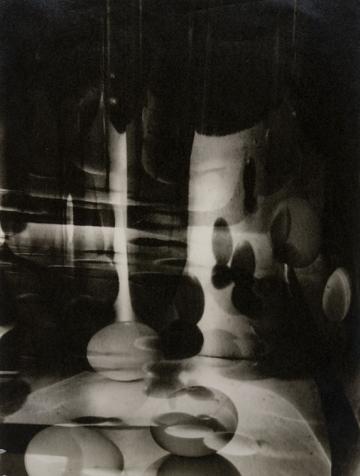
Eggs in Stage Setting
ca. 1948
Carlotta Corpron
(1901-1988)
_______________________
The World And I
This is not exactly what I mean
Any more than the sun is the sun.
But how to mean more closely
If the sun shines but approximately?
What a world of awkwardness!
What hostile implements of sense!
Perhaps this is as close a meaning
As perhaps becomes such knowing.
Else I think the world and I
Must live together as strangers and die—
A sour love, each doubtful whether
Was ever a thing to love the other.
No, better for both to be nearly sure
Each of each—exactly where
Exactly I and exactly the world
Fail to meet by a moment, and a word.
-
Laura Riding
_______________________

Circles/Rectangles
Carlotta Corpron
1945
_______________________
Beckett and Self-Translation..
Mark Bowles
(....)
Beneath the printed text is a chaos of ‘possibles’. The finished text was won from this chaos but the author-translator must descend into it once more.
But perhaps where is a further twist with Beckett. A sense in which Beckett's texts - as Deleuze suggests - are sometimes about this futile but necessary attempt to exhaust, to mine-out, the silence, the reserve of silence and chaos from which the text first sprang.
...(more)
_______________________

photo - mw
Happy Canada Day
|
































